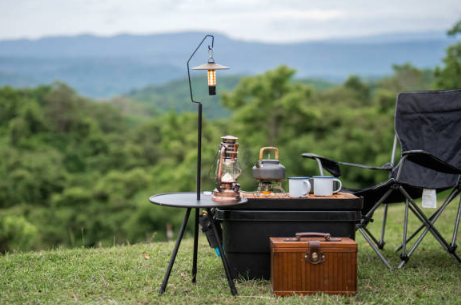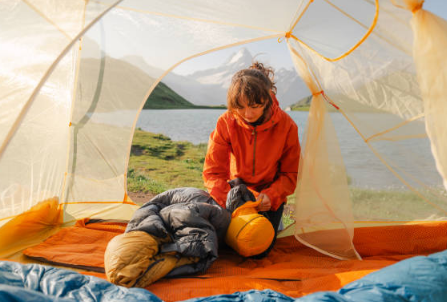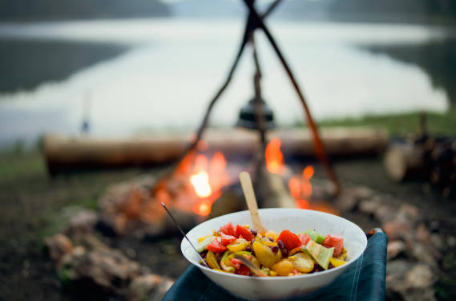A lot of people go out of their way to avoid being alone. So, why would anyone want to go camping by themselves?
As it turns out, there are plenty of upsides to spending time alone—freedom, independence, and space to think. Add the restorative power of nature and the perks of solo camping, and you’ve got yourself a surprisingly meaningful and empowering experience.
In this post, you’ll discover why solo camping is not only not weird, but actually a deeply inspiring thing to do. Plus, I’ll walk you through how to transition from social camping to an adventure that’s just you, your tent (and a few essentials), and the great outdoors.

7 Amazing Benefits of Solo Camping
If you’re introverted or naturally enjoy alone time, you can probably already imagine some of the benefits of solo camping. But if solitude isn’t your thing, you might need a little more convincing. Here are some powerful reasons to give it a try:
1. Total Freedom
One of the best things about camping alone? You get to do whatever you want, whenever you want. You can plan your days exactly how you like—no compromises, no check-ins, no group decisions. That kind of freedom can feel incredibly refreshing in a world where we’re constantly adjusting for others. Want to sleep in until noon? Go for it.
2. You Can Go Anytime
Another perk? You’re not waiting around for others to be available or on board. If your friends aren’t into camping, that doesn’t stop you. You can head out on a spontaneous weeknight trip if the weather’s great and your schedule’s open. Try doing that with a group—it’s nearly impossible without tons of planning.
3. Solitude Reduces Stress
In today’s noisy, fast-paced world, simply stepping away can do wonders for your mental health. There’s a reason it’s often called an “escape.” Studies show that when people choose to be alone, it can be deeply calming and stress-reducing. Of course, a peaceful solo trip depends on solid planning. Be sure to follow all safety tips to avoid stress-inducing surprises!
4. You Get to Know Yourself Better
With no one else around to distract you, solo camping creates space to tune in. You might find yourself paying attention to feelings or thoughts you’d normally ignore. Sure, it can feel uncomfortable at first—but with time, you’ll discover things about yourself you never noticed before.
5. It Builds Confidence and Mental Strength
Camping alone has its challenges. You’re the one making all the decisions and handling any unexpected situations. But as your camping skills grow, you’ll realize just how capable you are. You’ll walk away feeling stronger, more self-reliant, and more confident—benefits that spill into every area of your life.
6. Time to Reflect
Every time I go on a solo camping trip, I look forward to having quiet time to reflect. I often plan what I want to think through—but funnily enough, I usually end up thinking a lot less than expected. Everyone’s different, but being alone in nature gives you the chance to slow down and think—or simply be.
7. You’ll Connect with Nature on a Deeper Level
One of my favorite parts of solo camping is how deeply connected I feel to nature. It’s so much quieter without other people around, meaning you’re less likely to scare off wildlife and more likely to notice the tiny wonders around you. When I’m with others, I miss things like strange insects or unusual plants. But alone, I see so much more.
Start Local and Keep It Simple
If you’ve never camped alone before, ease into it with a low-pressure, local trip. Try camping in your own backyard to get comfortable. If that goes well, reserve a spot at a nearby campground. It’ll feel more adventurous but still offer facilities and safety.
Feeling confident? Book a hike-in campsite that’s a bit more remote—but still has basic amenities. After that, you might be ready for a truly off-grid solo camping experience.
For more tips, check out our “Solo Wild Camping” guide!
Bring Along Some Entertainment
Some people are totally content just sitting quietly in nature or chatting with fellow campers. But especially at first, solo camping can feel awkward or even boring. That’s okay! Bring some solo-friendly entertainment to keep things fun and relaxing.
Here are a few ideas:
-
Play a solo card game like Solitaire
-
Go birdwatching or explore with a field guide and binoculars
-
Try a simple camp craft—carve a spoon or make tent stakes
-
Read an adventure book to fuel your own sense of discovery
-
Keep a journal—reflecting on your trip can be surprisingly insightful
-
Write a story—solitude gives your mind space to wander creatively
-
Sketch or paint—it’s a calming way to pass time and stay present
-
Cook something new—you’ve got time to experiment (and no one to judge!)
-
Practice photography—capture the moment in your own unique way
-
Try foraging—but only if you really know what you’re doing
Double-Check Your Gear
One of the best (and most challenging) parts of solo camping is self-reliance. You’ve got to be ready to handle everything—bad weather, broken gear, or even forgetting a meal—on your own.
So check and re-check your gear:
-
Tent? Don’t forget the poles and stakes!
-
Sleeping bag? Make sure the zipper works.
-
Food and fuel? Bring more than you think you need.
-
Stove? Bring a backup option just in case.
Expect Some Discomfort
Sleeping in a tent isn’t always comfy—but the discomfort I’m talking about isn’t just physical. Solo camping can be emotionally tough. You might feel scared, vulnerable, or even lonely. Anticipating those feelings can really help. And while I don’t suggest doom-scrolling through YouTube all night, practicing mindfulness, journaling, or drawing can make a big difference.
Pick a Spot With Phone Signal
Yes, some campers prefer to be totally off the grid. But unless you’re experienced and have a solid safety plan, staying somewhere with phone reception is smart. Having signal means you can call for help if something goes wrong. Just don’t forget your charger or battery pack!
Camp Discreetly and Leave No Trace
One of the key rules of wild camping is to keep a low profile. The less attention you draw, the better. That means no campfires, and pack everything out. In some cases, it even means waiting until dark to pitch your tent.
Not only does this protect nature and landowner goodwill, it also helps you feel safer—especially at night. If no one knows you’re there, they can’t bother you.
Always Check the Weather
And check it again. Good weather makes solo camping magical. Bad weather? Not so much. Even simple tasks, like pitching your tent in the wind or rain, can be way harder and a lot less fun when you’re alone.
Be aware that weather in coastal or mountain areas can shift quickly. If things turn bad, don’t hesitate to head home.
Share Your Plans
Always let someone know where you’re going—even for local trips. This is especially critical when camping solo. Create a plan with your expected schedule and location, and share it with at least one or two people. That way, if something does go wrong, help will know when (and where) to look.
Whether you’re pitching a tent in your backyard or heading off on a multi-day solo trek in the wild, camping alone can be deeply rewarding and incredibly fun. Just remember to tell someone your plan—and like any good scout—be prepared!


